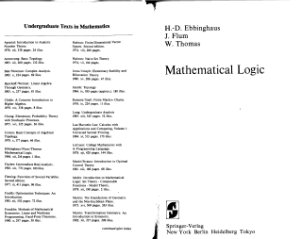Издательство Springer, 1984, -113 pp.
Some of the central questions of mathematical logic are: What is a mathematical proof? How can proofs be justified? Are there limitations to provability? To what extent can machines carry out mathematical proofs?
Only in this century has there been success in obtaining substantial and satisfactory answers, the most pleasing of which is given by G?del's completeness theorem: It is possible to exhibit (in the framework of first-order languages) a simple list of inference rules which suffices to carry out all mathematical proofs. "Negative" results, however, appear in G?del's incompleteness theorems. They show, for example, that it is impossible to prove all true statements of arithmetic, and thus they reveal principal limitations of the axiomatic method.
This book begins with an introduction to first-order logic and a proof of G?del's completeness theorem. There follows a short digression into model theory which shows that first-order languages have some deficiencies in expressive power. For example, they do not allow the formulation of an adequate axiom system for arithmetic or analysis. On the other hand, this difficulty can be overcome-even in the framework of first-order logic-by developing mathematics in set-theoretic terms. We explain the prerequisites from set theory that are necessary for this purpose and then treat the subtle relation between logic and set theory in a thorough manner. G?del's incompleteness theorems are presented in connection with several related results (such as Trahtenbrot's theorem) which all exemplify the limitations of machine oriented proof methods. The notions of computability theory that are relevant to this discussion are given in detail. The concept of computability is made precise by means of a simple programming language.
The development of mathematics in the framework of first-order logic (as indicated above) makes use of set-theoretic notions to an extent far beyond that of mathematical practice. As an alteative one can consider logical systems with more expressive power. We introduce s6me of these systems, such as second-order and infinitary logics. In each of these cases we point out deficiencies contrasting first-order logic. Finally, this empirical fact is confirmed by Lindstr6m's theorems, which show that there is no logical system that extends first-order logic and at the same time shares all its advantages.
The book does not require special mathematical knowledge; however, it presupposes an acquaintance with mathematical reasoning as acquired, for example, in the first year of a mathematics or computer science curriculum. Exercises enable the reader to test and deepen his understanding of the text. The references in the bibliography point out essays of historical importance, further investigations, and related fields.
Part A
Introduction
Syntax of First-Order Languages
Semantics of First-Order Lang
A Sequent Calculus
The Completeness Theorem
The L?wenheim-Skolem Theorem and the Compactness Theorem
The Scope of First-Order Logic
Part B
Extensions of First-Order Logic
Limitations of the Formal Method
An Algebraic Characterization of Elementary Equivalence
Characterizing First-Order Logic
Some of the central questions of mathematical logic are: What is a mathematical proof? How can proofs be justified? Are there limitations to provability? To what extent can machines carry out mathematical proofs?
Only in this century has there been success in obtaining substantial and satisfactory answers, the most pleasing of which is given by G?del's completeness theorem: It is possible to exhibit (in the framework of first-order languages) a simple list of inference rules which suffices to carry out all mathematical proofs. "Negative" results, however, appear in G?del's incompleteness theorems. They show, for example, that it is impossible to prove all true statements of arithmetic, and thus they reveal principal limitations of the axiomatic method.
This book begins with an introduction to first-order logic and a proof of G?del's completeness theorem. There follows a short digression into model theory which shows that first-order languages have some deficiencies in expressive power. For example, they do not allow the formulation of an adequate axiom system for arithmetic or analysis. On the other hand, this difficulty can be overcome-even in the framework of first-order logic-by developing mathematics in set-theoretic terms. We explain the prerequisites from set theory that are necessary for this purpose and then treat the subtle relation between logic and set theory in a thorough manner. G?del's incompleteness theorems are presented in connection with several related results (such as Trahtenbrot's theorem) which all exemplify the limitations of machine oriented proof methods. The notions of computability theory that are relevant to this discussion are given in detail. The concept of computability is made precise by means of a simple programming language.
The development of mathematics in the framework of first-order logic (as indicated above) makes use of set-theoretic notions to an extent far beyond that of mathematical practice. As an alteative one can consider logical systems with more expressive power. We introduce s6me of these systems, such as second-order and infinitary logics. In each of these cases we point out deficiencies contrasting first-order logic. Finally, this empirical fact is confirmed by Lindstr6m's theorems, which show that there is no logical system that extends first-order logic and at the same time shares all its advantages.
The book does not require special mathematical knowledge; however, it presupposes an acquaintance with mathematical reasoning as acquired, for example, in the first year of a mathematics or computer science curriculum. Exercises enable the reader to test and deepen his understanding of the text. The references in the bibliography point out essays of historical importance, further investigations, and related fields.
Part A
Introduction
Syntax of First-Order Languages
Semantics of First-Order Lang
A Sequent Calculus
The Completeness Theorem
The L?wenheim-Skolem Theorem and the Compactness Theorem
The Scope of First-Order Logic
Part B
Extensions of First-Order Logic
Limitations of the Formal Method
An Algebraic Characterization of Elementary Equivalence
Characterizing First-Order Logic

